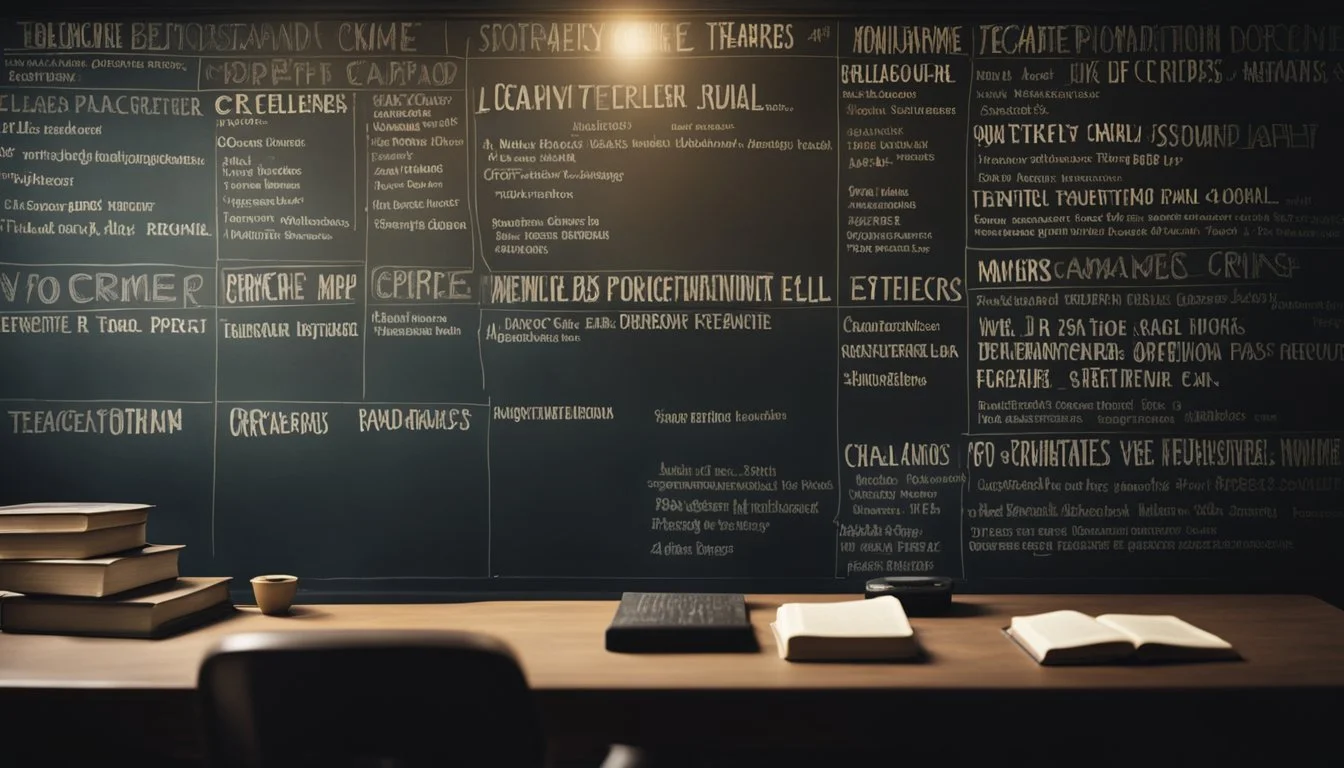5 True Crime Documentaries About Teachers
Uncovering Hidden Stories
True crime documentaries have captivated audiences worldwide, revealing shocking and often tragic stories that delve into the darker aspects of human nature. This fascination extends into the educational sphere, where teachers—figures often associated with safety and learning—become central characters in gripping, real-life narratives.
Why do stories involving teachers in true crime documentaries resonate so deeply with viewers? Perhaps it's the stark contrast between the expected roles of educators and the heinous crimes that some become involved in, either as victims or perpetrators, that draws us in. These documentaries not only spotlight individual stories but also reflect on broader societal themes, making them thought-provoking and compelling.
1) The Principal: Radovan Karadzic (2010)
Radovan Karadzic, a former Bosnian Serb leader, led a double life that shocked the world. Once a practicing psychiatrist and poet, he became known as one of the most notorious figures from the Yugoslav Wars.
After disappearing for over a decade, Karadzic was eventually found living under an assumed identity.
Al Jazeera's documentary, "The Secret Life of Radovan Karadzic" (2010), provides an exclusive insight into how Karadzic evaded justice. Through footage and interviews, viewers can see the extreme measures he took to hide his true identity while continuing to live in plain sight.
The film explores his involvement in war crimes, especially the Srebrenica massacre.
For more information on this documentary, visit Al Jazeera’s documentary page.
2) The Teacher and the Murderer: Jean Harris
Jean Harris, a private school headmistress, gained infamy in 1980 after being convicted for the murder of Dr. Herman Tarnower. Dr. Tarnower was a well-known cardiologist and author of "The Complete Scarsdale Medical Diet."
Harris claimed the shooting was accidental, occurring during a confrontation about their tumultuous relationship.
Harris was a respected figure in education, serving as the headmistress of The Madeira School for girls in Virginia. Her background and the high-profile nature of the case drew significant media attention. What added to the sensationalism was her portrayal as a scorned lover seeking revenge.
The dynamics of their relationship, combined with Harris's prominent role in education, led to widespread fascination with the case.
Several documentaries have explored the case, delving into the complexities of Harris's character and the controversial trial. One notable film is "Mrs. Harris" (2005), which provides a dramatized yet insightful look into the events leading up to the murder and the ensuing legal battles. The film stars Annette Bening as Jean Harris, capturing her struggles and the societal pressures she faced.
More about Mrs. Harris (2005) on IMDB.
3) Tales of Betrayal: The Pamela Smart Story
Pamela Smart's story is one of the most well-known in the realm of true crime.
She's a high school teacher who was convicted in 1991 for conspiring with her teenage lover to murder her husband.
This case received extensive media attention and was adapted into several films and documentaries.
One notable adaptation is the made-for-TV movie "Murder in New Hampshire: The Pamela Wojas Smart Story" (1991) starring Helen Hunt.
The film dramatizes the events leading up to and following the murder, offering a detailed look at the manipulation and betrayal involved. More Info
Another significant portrayal is the documentary "Captivated: The Trials of Pamela Smart" available on Peacock.
This documentary explores the media frenzy surrounding the case and its impact on the trial's outcome. More Info
Pamela Smart's story continues to be a subject of interest due to its complex themes of love, betrayal, and crime.
It serves as a cautionary tale about the consequences of manipulation and the dark side of human relationships.
4) The Educator's Darkness: The Neal Sweeney Case
Neal Sweeney, a former University of Tulsa football player, turned businessman, was fatally shot in 2008 at his office in Tulsa, Oklahoma. He was the owner of Retail Fuels Marketing. Sweeney's murder shocked the local community and led to an extensive investigation.
Prosecutors revealed a tangled web of conspiracies. They asserted Sweeney’s death was orchestrated by Aziz Rahman, who had hired Allen Shields to carry out the hit. Rahman allegedly wanted Sweeney dead due to a business dispute over unpaid fuel bills.
The case saw multiple trials and significant media coverage. Alonzo Johnson, found guilty in 2012, received two consecutive life sentences. His trial involved detailed presentations of crime scene evidence, which played a crucial role in his conviction.
The involvement of various individuals underscored the complexities and dark motives behind the crime. This story reflects on how financial disputes can escalate into violent outcomes, leaving a lasting impact on families and communities.
For more information on the case, visit the IMDB page for further insights and context.
5) Classroom Crime: Mary Kay Letourneau
The case of Mary Kay Letourneau is one of the most notorious crimes involving a teacher. In 1997, Letourneau, a 34-year-old married teacher from Seattle, was convicted of child rape.
Letourneau's relationship with Vili Fualaau, her 12-year-old student, shocked the nation. Despite being married with four children, she engaged in a sexual relationship with him, which led to her arrest.
Media coverage was intense, and Letourneau's case was widely discussed in the public sphere. Many debated whether her actions were criminal or misguided love.
For a more detailed exploration, see the documentary "Mary Kay Letourneau: Notes on a Scandal" (2022) IMDb.
Impact of True Crime Documentaries
True crime documentaries not only affect how society views crime but also the perception of certain professions. These documentaries can shape opinions and have significant educational implications.
Public Perception of Teachers
True crime documentaries that feature teachers as central figures can significantly alter public perceptions of the teaching profession.
When a teacher is portrayed as a villain or a suspect, it can undermine trust in educators.
Parents and students may become more wary, questioning the reputability of their instructors.
Teachers generally hold positions of trust and authority, but repeated exposure to negative portrayals can erode that trust. This distrust can lead to increased scrutiny of teachers’ personal lives and professional conduct.
Documentaries that highlight rare and exceptional cases can warp societal views, making such incidents seem more common than they actually are.
Educational Implications
There are also specific impacts on the field of education itself.
Administrators may feel obliged to implement stricter background checks and monitoring procedures.
Educational institutions could face increased pressure to address the professional and personal behavior of their staff.
Additionally, these documentaries can sometimes raise awareness about important issues such as teacher-student boundaries and the need for better oversight.
Conversely, they can also contribute to a climate of fear that might discourage potential educators from entering the profession.
This can have long-term implications for teacher recruitment and retention, affecting the overall quality of education.
By presenting a nuanced view, true crime documentaries can foster a dialogue about necessary reforms in educational policies and practices.
Case Studies and Analysis
This section provides an examination of the psychological profiles of the involved individuals and the investigative techniques used in the featured true crime documentaries about teachers.
Psychological Profiles
In “Teacher's Innocent Love Leads To Obsession and Death”, the psychological disintegration of a teacher into fatal obsession is paramount. The documentary scrutinizes the transition from innocent affection to dangerous fixation, focusing on triggers and warning signs.
“WHY I KILLED MY TEACHER” delves into the motives of William Cornick. This case explores how a seemingly normal student could harbor violent tendencies, shedding light on underlying psychological issues like suppressed anger and sociopathic traits.
Understanding the psychological backdrop assists in recognizing early signs of potential threats in educational environments, offering crucial insights into preventing similar tragedies.
Investigation Techniques
True crime documentaries utilize a variety of investigative techniques to unravel these complex cases. “True Crime Television as 'Popular Legality': Affect, Testimonial” suggests established methodologies such as crime scene analysis, forensic evidence, and witness testimonials in piecing together events.
In “Consumption of True Crimes and Perceived Vulnerability”, there is an emphasis on qualitative research to understand how true crime narratives influence public perception. This involves comparing cultural settings and crime rates to contextualize the investigations.
Each documentary carefully presents evidence, from reenactments to interviews, ensuring an engaging yet informative narrative for the audience. The systematic uncovering of facts highlights the intricate process behind solving such perplexing crimes.






